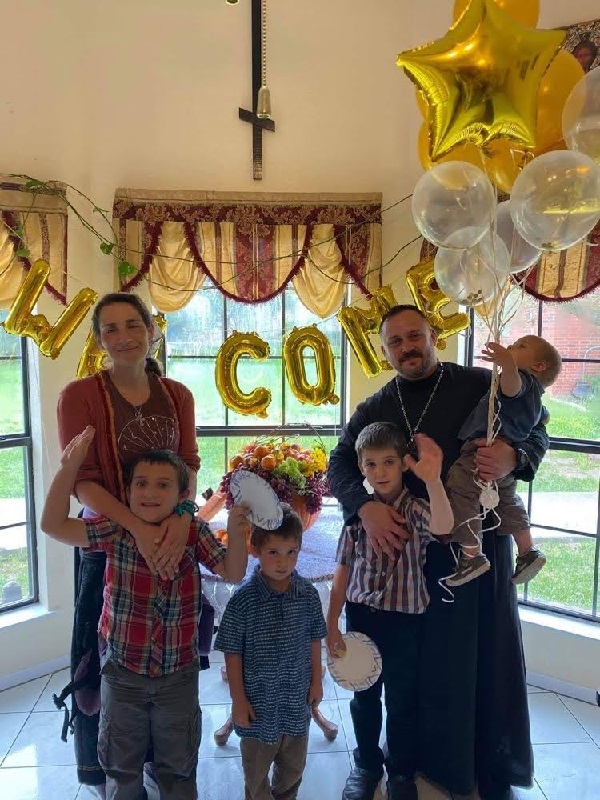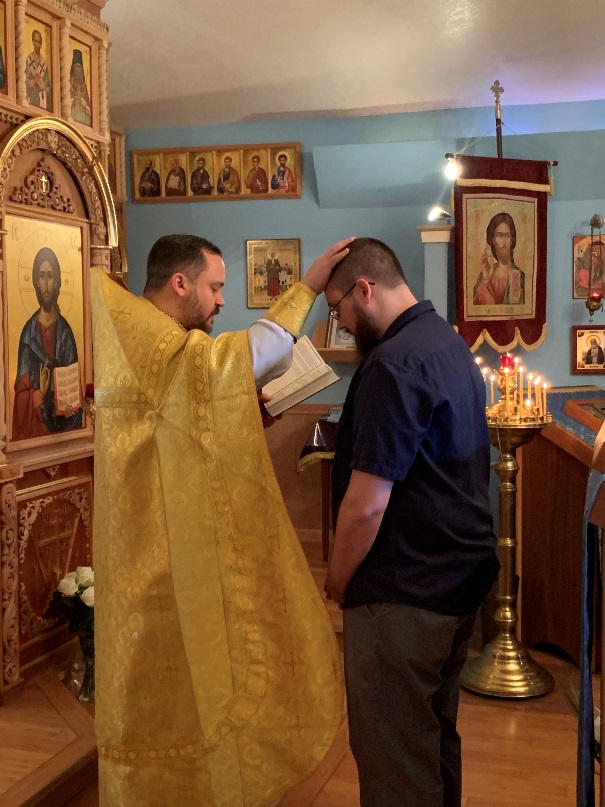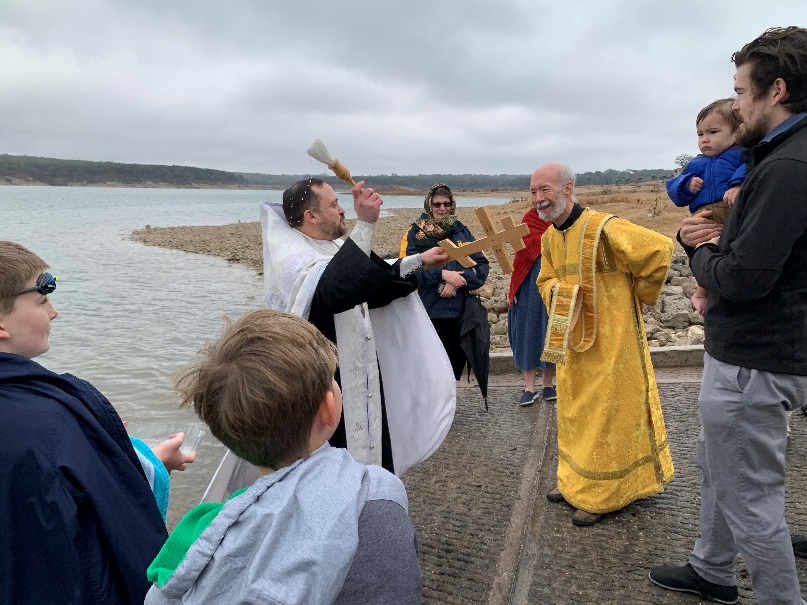
– You lived in several states: California, Pennsylvania, Michigan, now Texas. What did you enjoy most about each of the states?
My family moved to California from Canada when I was nine, because my dad is American and he missed the sunny California climate. I love the landscape and weather in California; you can travel from Yosemite National Park to the Ocean in a single day. California is magical when it comes to its geographical diversity and beauty. We went to seminary in Pennsylvania, and to be honest, there’s not a lot to love in Pennsylvania! I worked for an Italian caterer during seminary, so I can honestly say that delicious Italian food was the highlight of what the state had to offer. We also lived in Colorado for two years, and we loved the climate and majestic mountains! Colorado is almost always sunny, and the scenic mountains are stunning. I loved the people in Michigan, both the blue-collar people I worked with, and Fr. Gregory Joyce and the parishioners at St. Vladimir’s in Ann Arbor. Like Michigan, it’s the people in Texas that are great! I also love the desert climate of Texas, I have a real affinity for the desert. Perhaps it’s because the first place that we moved to in California was a desert climate, but there’s a silent openness to the desert that makes my heart soar. And then there’s the little things about Texas, like most of the stores were closed for western easter, which was very touching for me to see. Texas feels like how America was intended to be. Interesting fact, I first traveled to Texas when I was about 3-months old for a family reunion, because my dad’s family is largely from here.
– When and how did your conversion to Orthodoxy happen?
Matushka Ruth and I took a class in college called “Light from the Christian East: Eastern Orthodoxy and Early Church History”. There’s a book published by the name Light from the Christian East, which was written by our professor, Dr. James Payton. We went to the Divine Liturgy and the attraction was just incredibly strong for us. It took me some time to sort out the questions, and to make sure we weren’t going astray, but the magnetism to the Church was from the beginning.
– Why did you decide to join the Russian Orthodox Church rather than any other archdiocese?
We love how Traditional ROCOR is. The practices of going to confession, fasting, daily prayers, and attending vigil, were all normal parts of life in a ROCOR parish. We became Orthodox to live the Orthodox ethos, and it’s hard to find that lifestyle in a parish outside of ROCOR. As a priest, I wanted to be somewhere where keeping the Traditional Orthodox lifestyle was normal. Most Russians who attend Church have a strong internal inclination for living the Orthodox life; they want to fast, they want the services to be complete, they keep daily prayers, they want to go to confession before Communion, they respect the office of the holy priesthood, etc. In America, some people think that ROCOR is stricter than the other jurisdictions, but when you read historical writing from even a 100-years ago you see that Orthodox countries had practices that look like ROCOR today. ROCOR has kept the tradition of the Church, whereas most of the Orthodox jurisdictions in America are basically liturgical protestants at best, and ethnic social clubs at worst.

– You are a father both as a Priest and as a parent. Are there similarities and differences in these types of fatherhood?
This is a fantastic question and worthy of discussion, but I’ll keep my answer simple. I express my love for my children primarily as a protector, and a provider. My family needs to know that I’m always going to work for them as hard as possible to ensure they have a normal way of life and are taken care of, and that I’d fight to the death for them in a heartbeat if needed. I think this same ethos carries over to the Church; I’m here to provide the liturgical life of the Parish, I’m going to work as hard as I can to make sure that everyone is taken care of, and I’m going to hold the line on the Orthodox life and theology. I’m not going to allow wolves to come in and steal away the sheep. Maybe it’s my natural disposition that makes me intense, or maybe it’s the fact that I’ve encountered real evil, and encountered evil people. But, I know that strong men are needed, and I want to provide that strength and stability for those around me.
– What do you enjoy the most about fatherhood?
The greatest joy is simply to know my boys. I absolutely adore them, I find them fascinating, and I feel honored to be their father. And I love the fact that I’m giving them a childhood that I didn’t have. And there’s nothing on earth like walking in the door at the end of the day and they’re running to give me hugs, and get blessings. There’s a lot of love in our home, which is my most prized possession.
– What is the most difficult part of fatherhood for you?
I have to work a lot, and I don’t get to spend as much time with them as I would like.
– Tell us a little about your children. How old are they? What is your favorite thing to do with them?
I have four sons, ages 8, 6, 4, and 2. I could say a lot about them, but suffice it to say, they are all full of life. They’re real boys; full of energy, intrigue, a little naughtiness, and a lot of love.
– In what ways are your children similar to you?
They’re all pretty intense, affectionate, and they love to have fun and go on adventures.
– What do they enjoy the most about you?
They know that I love them ferociously, that I would protect them fearlessly, and that I like to have fun. One of them recently said that I’m a “holy crazy man”, which I think sums up their evaluation.
– What kind of a kid were you when you were a boy? Were you quiet and contemplative or active and sporty?
I had a very sensitive heart, was extremely active, and I liked to go on adventures and explore.
– What was your most memorable Father’s Day gift?
I’m typically given lego creations my boys have made me.
– What would you like to say to the Russian community of Austin?
Russians are a people with deep souls; much deeper in my estimation than most people living in the west. Russians know how to pour out their hearts in confession, they know how to empty their souls of the burden of sin, they know how their sins grieve God, and they know the holiness of God. Because of this, I don’t believe the Russian soul will ever find fulfilment outside of the Church. A Russian may come to America and be dazzled by the intelligentsia of the west, they may become quite accomplished and receive the accolades that they never received in Russia, they may love the lavish lifestyle afforded in America, but without Christ they’ll know that their souls are unfulfilled. So, go to Church if you’re not already. If you do go to Church, educate the converts on the Orthodox lifestyle and how to develop piety of the heart. The greatest aspects of Russian culture are shaped by the Orthodox Church, and without the anchor of the Orthodox lifestyle, the children of Russians will inevitably be shaped into the American image.

Editor: Olga Falkowski
Publisher: Russian Cultural Center
